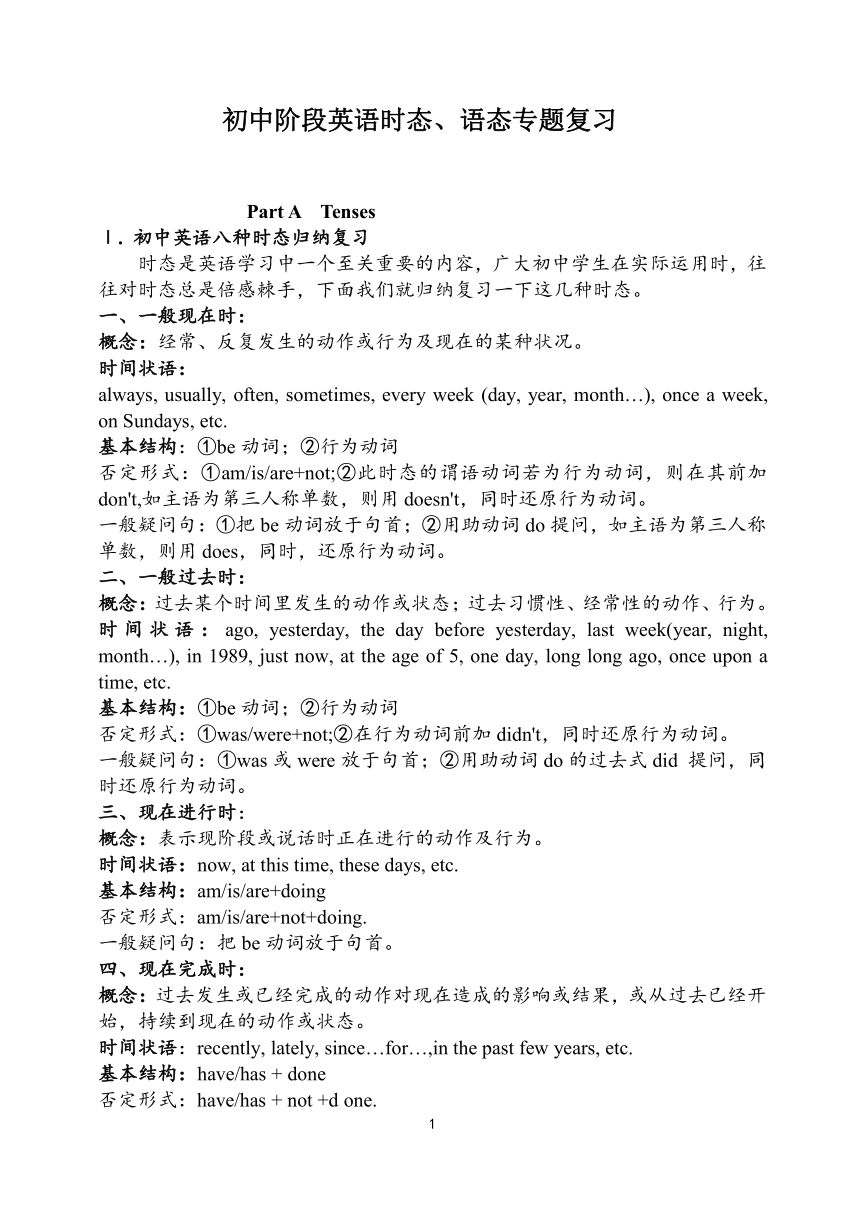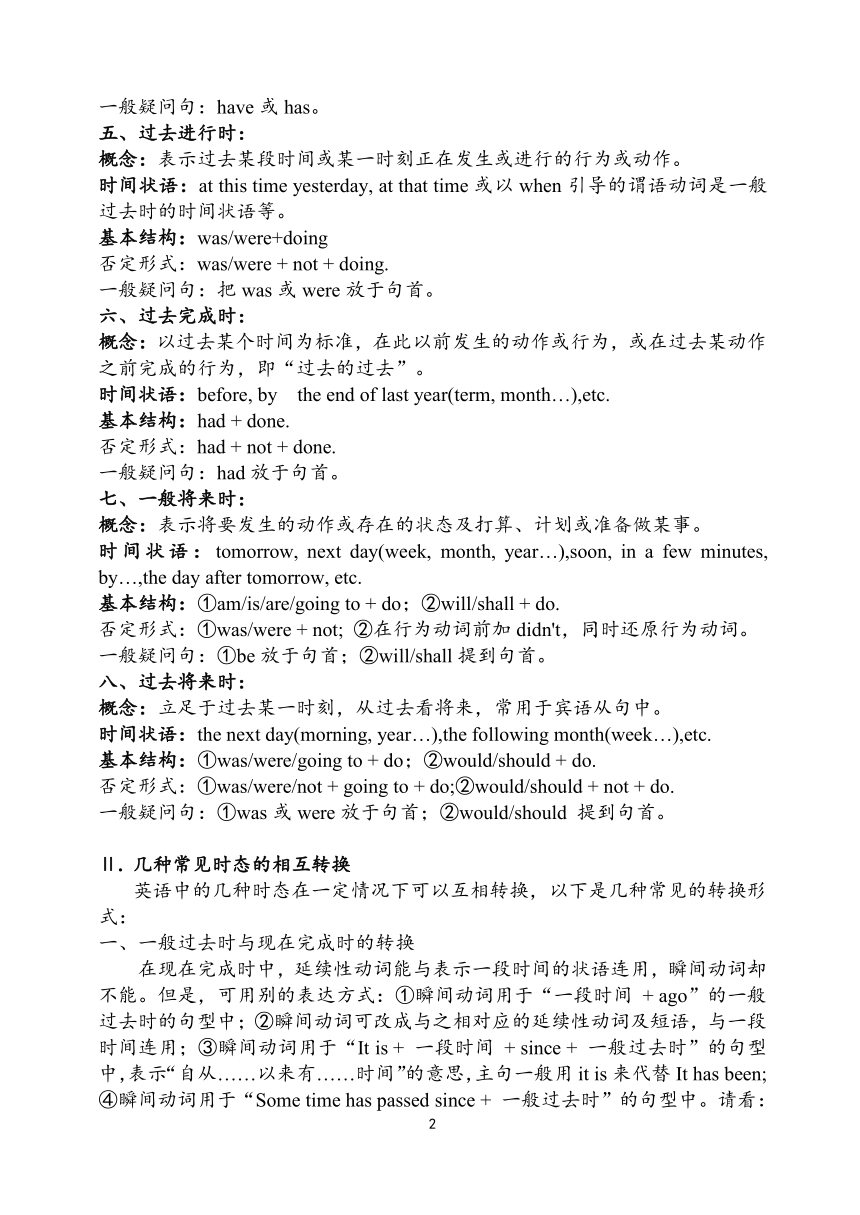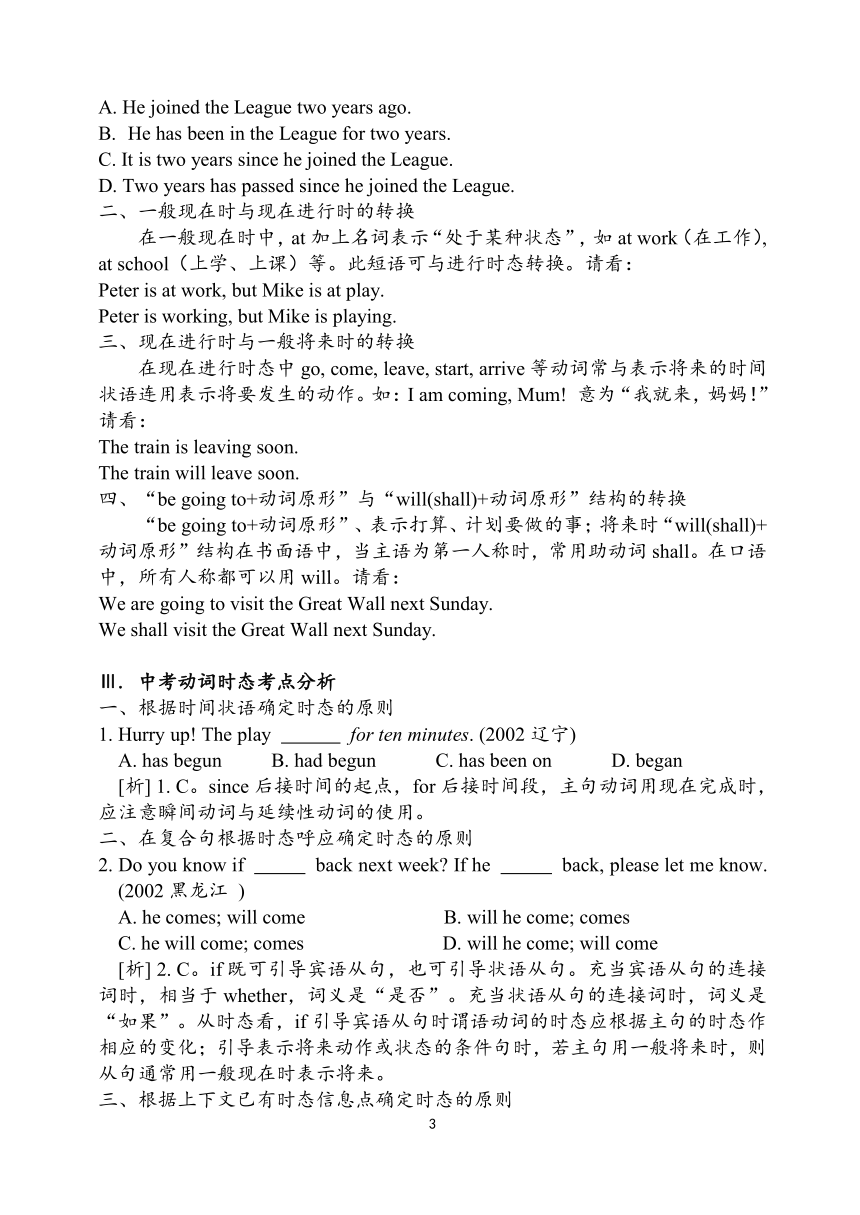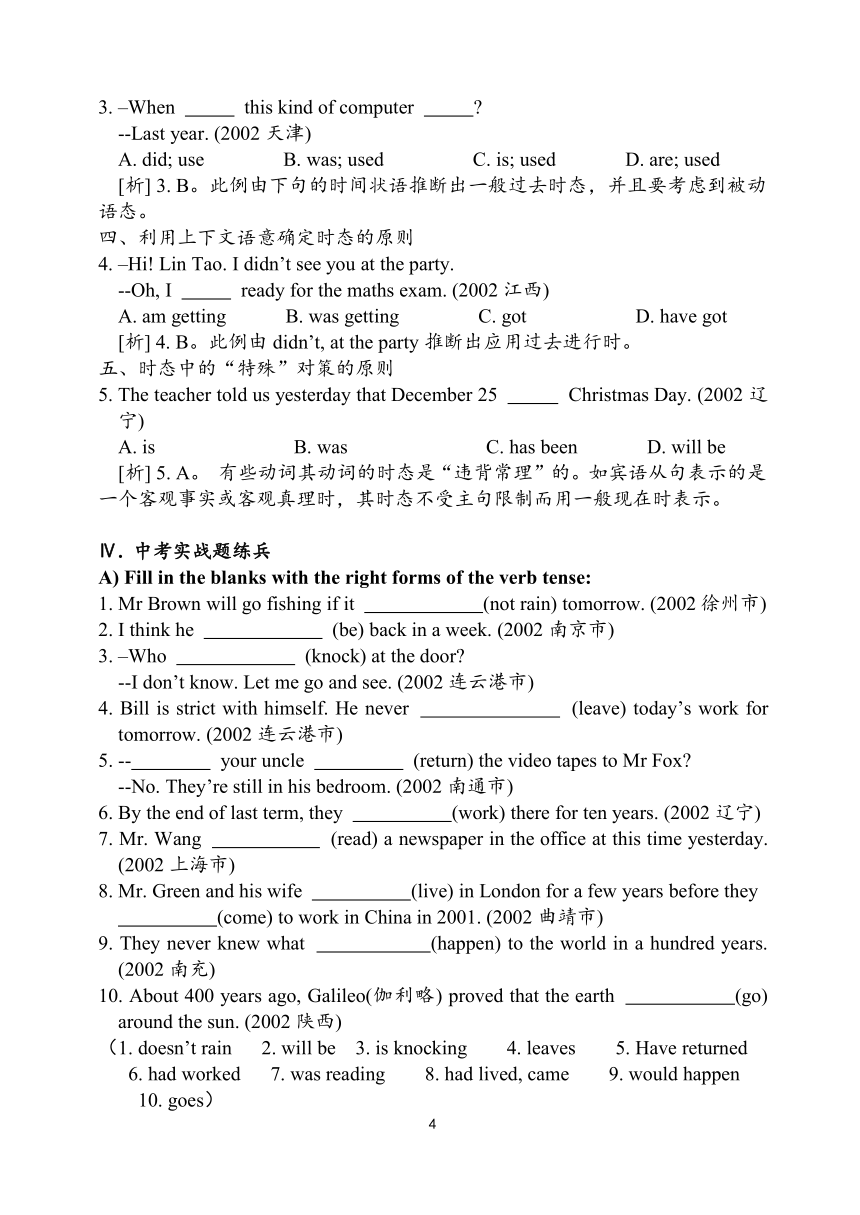中考总复习之初中阶段英语时态、语态专题复习[下学期]
文档属性
| 名称 | 中考总复习之初中阶段英语时态、语态专题复习[下学期] |

|
|
| 格式 | rar | ||
| 文件大小 | 16.6KB | ||
| 资源类型 | 教案 | ||
| 版本资源 | 通用版 | ||
| 科目 | 英语 | ||
| 更新时间 | 2009-06-29 00:00:00 | ||
图片预览




文档简介
初中阶段英语时态、语态专题复习
Part A Tenses
Ⅰ. 初中英语八种时态归纳复习
时态是英语学习中一个至关重要的内容,广大初中学生在实际运用时,往往对时态总是倍感棘手,下面我们就归纳复习一下这几种时态。
一、一般现在时:
概念:经常、反复发生的动作或行为及现在的某种状况。
时间状语:
always, usually, often, sometimes, every week (day, year, month…), once a week, on Sundays, etc.
基本结构:①be动词;②行为动词
否定形式:①am/is/are+not;②此时态的谓语动词若为行为动词,则在其前加don't,如主语为第三人称单数,则用doesn't,同时还原行为动词。
一般疑问句:①把be动词放于句首;②用助动词do提问,如主语为第三人称单数,则用does,同时,还原行为动词。
二、一般过去时:
概念:过去某个时间里发生的动作或状态;过去习惯性、经常性的动作、行为。
时间状语:ago, yesterday, the day before yesterday, last week(year, night, month…), in 1989, just now, at the age of 5, one day, long long ago, once upon a time, etc.
基本结构:①be动词;②行为动词
否定形式:①was/were+not;②在行为动词前加didn't,同时还原行为动词。
一般疑问句:①was或were放于句首;②用助动词do的过去式did 提问,同时还原行为动词。
三、现在进行时:
概念:表示现阶段或说话时正在进行的动作及行为。
时间状语:now, at this time, these days, etc.
基本结构:am/is/are+doing
否定形式:am/is/are+not+doing.
一般疑问句:把be动词放于句首。
四、现在完成时:
概念:过去发生或已经完成的动作对现在造成的影响或结果,或从过去已经开始,持续到现在的动作或状态。
时间状语:recently, lately, since…for…,in the past few years, etc.
基本结构:have/has + done
否定形式:have/has + not +d one.
一般疑问句:have或has。
五、过去进行时:
概念:表示过去某段时间或某一时刻正在发生或进行的行为或动作。
时间状语:at this time yesterday, at that time或以when引导的谓语动词是一般过去时的时间状语等。
基本结构:was/were+doing
否定形式:was/were + not + doing.
一般疑问句:把was或were放于句首。
六、过去完成时:
概念:以过去某个时间为标准,在此以前发生的动作或行为,或在过去某动作之前完成的行为,即“过去的过去”。
时间状语:before, by the end of last year(term, month…),etc.
基本结构:had + done.
否定形式:had + not + done.
一般疑问句:had放于句首。
七、一般将来时:
概念:表示将要发生的动作或存在的状态及打算、计划或准备做某事。
时间状语:tomorrow, next day(week, month, year…),soon, in a few minutes, by…,the day after tomorrow, etc.
基本结构:①am/is/are/going to + do;②will/shall + do.
否定形式:①was/were + not; ②在行为动词前加didn't,同时还原行为动词。
一般疑问句:①be放于句首;②will/shall提到句首。
八、过去将来时:
概念:立足于过去某一时刻,从过去看将来,常用于宾语从句中。
时间状语:the next day(morning, year…),the following month(week…),etc.
基本结构:①was/were/going to + do;②would/should + do.
否定形式:①was/were/not + going to + do;②would/should + not + do.
一般疑问句:①was或were放于句首;②would/should 提到句首。
Ⅱ. 几种常见时态的相互转换
英语中的几种时态在一定情况下可以互相转换,以下是几种常见的转换形式:
一、一般过去时与现在完成时的转换
在现在完成时中,延续性动词能与表示一段时间的状语连用,瞬间动词却不能。但是,可用别的表达方式:①瞬间动词用于“一段时间 + ago”的一般过去时的句型中;②瞬间动词可改成与之相对应的延续性动词及短语,与一段时间连用;③瞬间动词用于“It is + 一段时间 + since + 一般过去时”的句型中,表示“自从……以来有……时间”的意思,主句一般用it is来代替It has been;④瞬间动词用于“Some time has passed since + 一般过去时”的句型中。请看:
A. He joined the League two years ago.
B. He has been in the League for two years.
C. It is two years since he joined the League.
D. Two years has passed since he joined the League.
二、一般现在时与现在进行时的转换
在一般现在时中,at加上名词表示“处于某种状态”,如at work(在工作), at school(上学、上课)等。此短语可与进行时态转换。请看:
Peter is at work, but Mike is at play.
Peter is working, but Mike is playing.
三、现在进行时与一般将来时的转换
在现在进行时态中go, come, leave, start, arrive等动词常与表示将来的时间状语连用表示将要发生的动作。如:I am coming, Mum! 意为“我就来,妈妈!”请看:
The train is leaving soon.
The train will leave soon.
四、“be going to+动词原形”与“will(shall)+动词原形”结构的转换
“be going to+动词原形”、表示打算、计划要做的事;将来时“will(shall)+动词原形”结构在书面语中,当主语为第一人称时,常用助动词shall。在口语中,所有人称都可以用will。请看:
We are going to visit the Great Wall next Sunday.
We shall visit the Great Wall next Sunday.
Ⅲ. 中考动词时态考点分析
1、 根据时间状语确定时态的原则
1. Hurry up! The play for ten minutes. (2002辽宁)
A. has begun B. had begun C. has been on D. began
[析] 1. C。since后接时间的起点,for后接时间段,主句动词用现在完成时,应注意瞬间动词与延续性动词的使用。
2、 在复合句根据时态呼应确定时态的原则
2. Do you know if back next week If he back, please let me know. (2002黑龙江 )
A. he comes; will come B. will he come; comes
C. he will come; comes D. will he come; will come
[析] 2. C。if既可引导宾语从句,也可引导状语从句。充当宾语从句的连接词时,相当于whether,词义是“是否”。充当状语从句的连接词时,词义是“如果”。从时态看,if引导宾语从句时谓语动词的时态应根据主句的时态作相应的变化;引导表示将来动作或状态的条件句时,若主句用一般将来时,则从句通常用一般现在时表示将来。
3、 根据上下文已有时态信息点确定时态的原则
3. –When this kind of computer
--Last year. (2002天津)
A. did; use B. was; used C. is; used D. are; used
[析] 3. B。此例由下句的时间状语推断出一般过去时态,并且要考虑到被动语态。
4、 利用上下文语意确定时态的原则
4. –Hi! Lin Tao. I didn’t see you at the party.
--Oh, I ready for the maths exam. (2002江西)
A. am getting B. was getting C. got D. have got
[析] 4. B。此例由didn’t, at the party推断出应用过去进行时。
5、 时态中的“特殊”对策的原则
5. The teacher told us yesterday that December 25 Christmas Day. (2002辽宁)
A. is B. was C. has been D. will be
[析] 5. A。 有些动词其动词的时态是“违背常理”的。如宾语从句表示的是一个客观事实或客观真理时,其时态不受主句限制而用一般现在时表示。
Ⅳ. 中考实战题练兵
A) Fill in the blanks with the right forms of the verb tense:
1. Mr Brown will go fishing if it (not rain) tomorrow. (2002徐州市)
2. I think he (be) back in a week. (2002南京市)
3. –Who (knock) at the door
--I don’t know. Let me go and see. (2002连云港市)
4. Bill is strict with himself. He never (leave) today’s work for tomorrow. (2002连云港市)
5. -- your uncle (return) the video tapes to Mr Fox
--No. They’re still in his bedroom. (2002南通市)
6. By the end of last term, they (work) there for ten years. (2002辽宁)
7. Mr. Wang (read) a newspaper in the office at this time yesterday. (2002上海市)
8. Mr. Green and his wife (live) in London for a few years before they
(come) to work in China in 2001. (2002曲靖市)
9. They never knew what (happen) to the world in a hundred years. (2002南充)
10. About 400 years ago, Galileo(伽利略) proved that the earth (go) around the sun. (2002陕西)
(1. doesn’t rain 2. will be 3. is knocking 4. leaves 5. Have returned
6. had worked 7. was reading 8. had lived, came 9. would happen
10. goes)
B) Complete the following sentences:
1. When I got to the cinema, (电影已经开始了二十分钟了). (2001黄岗)
2. (有一场音乐会)a concert tomorrow afternoon. (2000甘肃)
3. It’s three years since he (入团). (2001宁夏)
4. Please let me know (他一回来). (2000陕西)
5. I (正要入睡) when there was a loud knock at the door. (2000新疆)
(1. the film had been on for 20 minutes 2. There will be 3. has been a League member 4. as soon as he comes back 5. I was going to sleep)
Part B Voices
Ⅰ.The Passive Voice
一、Voices: The Active and Passive Voices
Active Voice 主动语态 Passive Voice
Many people speak English. English is spoken by many people.
They found the dinosaur eggs in Liaoning. The dinosaur eggs were found in Liaoning.
We must do something to stop the pollution. Something must be done to stop
the pollution.
二、The formations of the passive voices of different tenses(A):
方 式时 间 一 般 进 行 完 成
现 在 amis + pp.are amis being + pp.are has been + pp.have
过 去 was + pp. were was being + pp.were had been + pp.
将 来 shall be + pp.will
过 去将 来 should be + pp. would
The formations of the passive voices of modal verbs(B):
must/can/ may/should + be + pp.
三、When to use the Passive Voice:
1. 行为主体不明确,不必说出或者无法说出动作的执行者时。
Football is played all over the world.
2. 不易找到或根本就找不到动作的执行者时。
My bike was stolen.
3. 汉语含有“据说”、“有人说”等时。
It is said that another bridge has been built over the Changjiang River.
4. 汉语中含有“被”、“由”等词时。
Wei Hua is asked to come by Lin Tao.
5. 汉语中没有“被”、“由”等词,而在原句中试加这类词且句意通顺时。
These songs are usually sung by boys.
6. 某些句子习惯上用被动语态。
He was born in October, 1988.
7. 表示礼貌时。
You are friendly invited to come to our English party at 8:00p.m. tomorrow.
(Note: 用于被动语态中的动词是及物动词,不及物动词不能用被动语态。)
Ⅱ. 中考实战题练兵
A) Fill in the blanks with the right forms of the verbs given:
1. Last month, in the first match of the 17th World Cup, France (beat)
0-1 by a new team—Senegal. (2002南京市)
2. How many fridges (build) in China in the last two years (2002徐州市)
3. No dictionary should (bring) to the English exam, boys and girls! (2002连云港市)
4. That day each of us (give) ten dollars after we finish the work.
(2002连云港市)
5. They (warn) not to touch the machine while they were visiting the workshop. (2001吉林)
( 1. was beaten 2. has been built 3. be brought 4. were given
5. were warned)
B) Multiple Choice:
( ) 1. I don’t know the school, but it’s to be quite a good one. (2002苏州市)
A. told B. spoken C. talked D. said
( ) 2. Please don’t stand up in class until you . (2002泰州市)
A. were told to B. are told to C. were told D. are told
( )3. If Mg in O2, we MgO, and it combination reaction
(化学变化). (2202泰州市)
A. will burn; get; calls B. burns; will get; called
C. will burn; can get; is calling D. burns; will get; is called
( ) 4. Please tell me when on the wall. (2002无锡市)
A. has this map hung B. was this map hung
C. this map has hung D. this map was hung
( ) 5. The doctor will operate on him at once as soon as he the hospital. (2002常州市)
A. is sent to B. will be taken to
C. leaves D. doesn’t return
( ) 6. They won’t be back until the work . (2002南通市)
A. do B. does C. is done D. will do
( ) 7. The medicine cool, clean and dry. (2001天津市)
A. must keep B. must be kept C. must be carried D. must be in
( ) 8. –Where’re the old houses here
--Oh, they by the end of last century, and a new tall building
here soon. (2002深圳市)
A. have been pulled down; is going to be built
B. were pulled down; will be built
C. had been pulled down; is going to be built
D. had been built; is going to be pulled down
( ) 9. You can’t leave now. There are still twenty more trees . (2002河北)
A. to plant B. being planted C. plant D. to be planted
( )10. –Where’s your car
--There’s something wrong with it and it in the garage now. (2001 四川)
A. is repaired B. is being repaired
C. has been repaired D. will be repaired
(1-5 DBDDA 6-10 CBCDB)
C) Put the following into English:
1. 近五年来在西昌已发射了几颗人造卫星。(2002南京市)
Several man-made satellites in Xichang in the past five years.
2. 请你告诉我这把锁是用什么制成的好吗?(2002无锡市)
Would you please tell me
3. 那个博物馆是八年前建造的。(2002苏州市)
.
4. 必须采取措施阻止人们砍伐树木。(2002泰州市)
to stop people from cutting trees down.
5. When he got there, he found all the food
(都吃光了). (2002通化市)
( 1. has been sent up 2. what the lock is made of 3. That museum was built 8 years ago. 4. Some steps must be taken 5. had been eaten up)
PAGE
8
Part A Tenses
Ⅰ. 初中英语八种时态归纳复习
时态是英语学习中一个至关重要的内容,广大初中学生在实际运用时,往往对时态总是倍感棘手,下面我们就归纳复习一下这几种时态。
一、一般现在时:
概念:经常、反复发生的动作或行为及现在的某种状况。
时间状语:
always, usually, often, sometimes, every week (day, year, month…), once a week, on Sundays, etc.
基本结构:①be动词;②行为动词
否定形式:①am/is/are+not;②此时态的谓语动词若为行为动词,则在其前加don't,如主语为第三人称单数,则用doesn't,同时还原行为动词。
一般疑问句:①把be动词放于句首;②用助动词do提问,如主语为第三人称单数,则用does,同时,还原行为动词。
二、一般过去时:
概念:过去某个时间里发生的动作或状态;过去习惯性、经常性的动作、行为。
时间状语:ago, yesterday, the day before yesterday, last week(year, night, month…), in 1989, just now, at the age of 5, one day, long long ago, once upon a time, etc.
基本结构:①be动词;②行为动词
否定形式:①was/were+not;②在行为动词前加didn't,同时还原行为动词。
一般疑问句:①was或were放于句首;②用助动词do的过去式did 提问,同时还原行为动词。
三、现在进行时:
概念:表示现阶段或说话时正在进行的动作及行为。
时间状语:now, at this time, these days, etc.
基本结构:am/is/are+doing
否定形式:am/is/are+not+doing.
一般疑问句:把be动词放于句首。
四、现在完成时:
概念:过去发生或已经完成的动作对现在造成的影响或结果,或从过去已经开始,持续到现在的动作或状态。
时间状语:recently, lately, since…for…,in the past few years, etc.
基本结构:have/has + done
否定形式:have/has + not +d one.
一般疑问句:have或has。
五、过去进行时:
概念:表示过去某段时间或某一时刻正在发生或进行的行为或动作。
时间状语:at this time yesterday, at that time或以when引导的谓语动词是一般过去时的时间状语等。
基本结构:was/were+doing
否定形式:was/were + not + doing.
一般疑问句:把was或were放于句首。
六、过去完成时:
概念:以过去某个时间为标准,在此以前发生的动作或行为,或在过去某动作之前完成的行为,即“过去的过去”。
时间状语:before, by the end of last year(term, month…),etc.
基本结构:had + done.
否定形式:had + not + done.
一般疑问句:had放于句首。
七、一般将来时:
概念:表示将要发生的动作或存在的状态及打算、计划或准备做某事。
时间状语:tomorrow, next day(week, month, year…),soon, in a few minutes, by…,the day after tomorrow, etc.
基本结构:①am/is/are/going to + do;②will/shall + do.
否定形式:①was/were + not; ②在行为动词前加didn't,同时还原行为动词。
一般疑问句:①be放于句首;②will/shall提到句首。
八、过去将来时:
概念:立足于过去某一时刻,从过去看将来,常用于宾语从句中。
时间状语:the next day(morning, year…),the following month(week…),etc.
基本结构:①was/were/going to + do;②would/should + do.
否定形式:①was/were/not + going to + do;②would/should + not + do.
一般疑问句:①was或were放于句首;②would/should 提到句首。
Ⅱ. 几种常见时态的相互转换
英语中的几种时态在一定情况下可以互相转换,以下是几种常见的转换形式:
一、一般过去时与现在完成时的转换
在现在完成时中,延续性动词能与表示一段时间的状语连用,瞬间动词却不能。但是,可用别的表达方式:①瞬间动词用于“一段时间 + ago”的一般过去时的句型中;②瞬间动词可改成与之相对应的延续性动词及短语,与一段时间连用;③瞬间动词用于“It is + 一段时间 + since + 一般过去时”的句型中,表示“自从……以来有……时间”的意思,主句一般用it is来代替It has been;④瞬间动词用于“Some time has passed since + 一般过去时”的句型中。请看:
A. He joined the League two years ago.
B. He has been in the League for two years.
C. It is two years since he joined the League.
D. Two years has passed since he joined the League.
二、一般现在时与现在进行时的转换
在一般现在时中,at加上名词表示“处于某种状态”,如at work(在工作), at school(上学、上课)等。此短语可与进行时态转换。请看:
Peter is at work, but Mike is at play.
Peter is working, but Mike is playing.
三、现在进行时与一般将来时的转换
在现在进行时态中go, come, leave, start, arrive等动词常与表示将来的时间状语连用表示将要发生的动作。如:I am coming, Mum! 意为“我就来,妈妈!”请看:
The train is leaving soon.
The train will leave soon.
四、“be going to+动词原形”与“will(shall)+动词原形”结构的转换
“be going to+动词原形”、表示打算、计划要做的事;将来时“will(shall)+动词原形”结构在书面语中,当主语为第一人称时,常用助动词shall。在口语中,所有人称都可以用will。请看:
We are going to visit the Great Wall next Sunday.
We shall visit the Great Wall next Sunday.
Ⅲ. 中考动词时态考点分析
1、 根据时间状语确定时态的原则
1. Hurry up! The play for ten minutes. (2002辽宁)
A. has begun B. had begun C. has been on D. began
[析] 1. C。since后接时间的起点,for后接时间段,主句动词用现在完成时,应注意瞬间动词与延续性动词的使用。
2、 在复合句根据时态呼应确定时态的原则
2. Do you know if back next week If he back, please let me know. (2002黑龙江 )
A. he comes; will come B. will he come; comes
C. he will come; comes D. will he come; will come
[析] 2. C。if既可引导宾语从句,也可引导状语从句。充当宾语从句的连接词时,相当于whether,词义是“是否”。充当状语从句的连接词时,词义是“如果”。从时态看,if引导宾语从句时谓语动词的时态应根据主句的时态作相应的变化;引导表示将来动作或状态的条件句时,若主句用一般将来时,则从句通常用一般现在时表示将来。
3、 根据上下文已有时态信息点确定时态的原则
3. –When this kind of computer
--Last year. (2002天津)
A. did; use B. was; used C. is; used D. are; used
[析] 3. B。此例由下句的时间状语推断出一般过去时态,并且要考虑到被动语态。
4、 利用上下文语意确定时态的原则
4. –Hi! Lin Tao. I didn’t see you at the party.
--Oh, I ready for the maths exam. (2002江西)
A. am getting B. was getting C. got D. have got
[析] 4. B。此例由didn’t, at the party推断出应用过去进行时。
5、 时态中的“特殊”对策的原则
5. The teacher told us yesterday that December 25 Christmas Day. (2002辽宁)
A. is B. was C. has been D. will be
[析] 5. A。 有些动词其动词的时态是“违背常理”的。如宾语从句表示的是一个客观事实或客观真理时,其时态不受主句限制而用一般现在时表示。
Ⅳ. 中考实战题练兵
A) Fill in the blanks with the right forms of the verb tense:
1. Mr Brown will go fishing if it (not rain) tomorrow. (2002徐州市)
2. I think he (be) back in a week. (2002南京市)
3. –Who (knock) at the door
--I don’t know. Let me go and see. (2002连云港市)
4. Bill is strict with himself. He never (leave) today’s work for tomorrow. (2002连云港市)
5. -- your uncle (return) the video tapes to Mr Fox
--No. They’re still in his bedroom. (2002南通市)
6. By the end of last term, they (work) there for ten years. (2002辽宁)
7. Mr. Wang (read) a newspaper in the office at this time yesterday. (2002上海市)
8. Mr. Green and his wife (live) in London for a few years before they
(come) to work in China in 2001. (2002曲靖市)
9. They never knew what (happen) to the world in a hundred years. (2002南充)
10. About 400 years ago, Galileo(伽利略) proved that the earth (go) around the sun. (2002陕西)
(1. doesn’t rain 2. will be 3. is knocking 4. leaves 5. Have returned
6. had worked 7. was reading 8. had lived, came 9. would happen
10. goes)
B) Complete the following sentences:
1. When I got to the cinema, (电影已经开始了二十分钟了). (2001黄岗)
2. (有一场音乐会)a concert tomorrow afternoon. (2000甘肃)
3. It’s three years since he (入团). (2001宁夏)
4. Please let me know (他一回来). (2000陕西)
5. I (正要入睡) when there was a loud knock at the door. (2000新疆)
(1. the film had been on for 20 minutes 2. There will be 3. has been a League member 4. as soon as he comes back 5. I was going to sleep)
Part B Voices
Ⅰ.The Passive Voice
一、Voices: The Active and Passive Voices
Active Voice 主动语态 Passive Voice
Many people speak English. English is spoken by many people.
They found the dinosaur eggs in Liaoning. The dinosaur eggs were found in Liaoning.
We must do something to stop the pollution. Something must be done to stop
the pollution.
二、The formations of the passive voices of different tenses(A):
方 式时 间 一 般 进 行 完 成
现 在 amis + pp.are amis being + pp.are has been + pp.have
过 去 was + pp. were was being + pp.were had been + pp.
将 来 shall be + pp.will
过 去将 来 should be + pp. would
The formations of the passive voices of modal verbs(B):
must/can/ may/should + be + pp.
三、When to use the Passive Voice:
1. 行为主体不明确,不必说出或者无法说出动作的执行者时。
Football is played all over the world.
2. 不易找到或根本就找不到动作的执行者时。
My bike was stolen.
3. 汉语含有“据说”、“有人说”等时。
It is said that another bridge has been built over the Changjiang River.
4. 汉语中含有“被”、“由”等词时。
Wei Hua is asked to come by Lin Tao.
5. 汉语中没有“被”、“由”等词,而在原句中试加这类词且句意通顺时。
These songs are usually sung by boys.
6. 某些句子习惯上用被动语态。
He was born in October, 1988.
7. 表示礼貌时。
You are friendly invited to come to our English party at 8:00p.m. tomorrow.
(Note: 用于被动语态中的动词是及物动词,不及物动词不能用被动语态。)
Ⅱ. 中考实战题练兵
A) Fill in the blanks with the right forms of the verbs given:
1. Last month, in the first match of the 17th World Cup, France (beat)
0-1 by a new team—Senegal. (2002南京市)
2. How many fridges (build) in China in the last two years (2002徐州市)
3. No dictionary should (bring) to the English exam, boys and girls! (2002连云港市)
4. That day each of us (give) ten dollars after we finish the work.
(2002连云港市)
5. They (warn) not to touch the machine while they were visiting the workshop. (2001吉林)
( 1. was beaten 2. has been built 3. be brought 4. were given
5. were warned)
B) Multiple Choice:
( ) 1. I don’t know the school, but it’s to be quite a good one. (2002苏州市)
A. told B. spoken C. talked D. said
( ) 2. Please don’t stand up in class until you . (2002泰州市)
A. were told to B. are told to C. were told D. are told
( )3. If Mg in O2, we MgO, and it combination reaction
(化学变化). (2202泰州市)
A. will burn; get; calls B. burns; will get; called
C. will burn; can get; is calling D. burns; will get; is called
( ) 4. Please tell me when on the wall. (2002无锡市)
A. has this map hung B. was this map hung
C. this map has hung D. this map was hung
( ) 5. The doctor will operate on him at once as soon as he the hospital. (2002常州市)
A. is sent to B. will be taken to
C. leaves D. doesn’t return
( ) 6. They won’t be back until the work . (2002南通市)
A. do B. does C. is done D. will do
( ) 7. The medicine cool, clean and dry. (2001天津市)
A. must keep B. must be kept C. must be carried D. must be in
( ) 8. –Where’re the old houses here
--Oh, they by the end of last century, and a new tall building
here soon. (2002深圳市)
A. have been pulled down; is going to be built
B. were pulled down; will be built
C. had been pulled down; is going to be built
D. had been built; is going to be pulled down
( ) 9. You can’t leave now. There are still twenty more trees . (2002河北)
A. to plant B. being planted C. plant D. to be planted
( )10. –Where’s your car
--There’s something wrong with it and it in the garage now. (2001 四川)
A. is repaired B. is being repaired
C. has been repaired D. will be repaired
(1-5 DBDDA 6-10 CBCDB)
C) Put the following into English:
1. 近五年来在西昌已发射了几颗人造卫星。(2002南京市)
Several man-made satellites in Xichang in the past five years.
2. 请你告诉我这把锁是用什么制成的好吗?(2002无锡市)
Would you please tell me
3. 那个博物馆是八年前建造的。(2002苏州市)
.
4. 必须采取措施阻止人们砍伐树木。(2002泰州市)
to stop people from cutting trees down.
5. When he got there, he found all the food
(都吃光了). (2002通化市)
( 1. has been sent up 2. what the lock is made of 3. That museum was built 8 years ago. 4. Some steps must be taken 5. had been eaten up)
PAGE
8
同课章节目录
- 词法
- 名词
- 动词和动词短语
- 动词语态
- 动词时态
- 助动词和情态动词
- 非谓语动词
- 冠词
- 代词
- 数词和量词
- 形容词副词及其比较等级
- 介词和介词短语
- 连词和感叹词
- 构词法
- 相似、相近词比较
- 句法
- 陈述句
- 一般疑问句和否定疑问句
- 特殊疑问句及选择疑问句
- 反意疑问句
- 存在句(There be句型)
- 宾语从句
- 定语从句
- 状语从句
- 主谓一致问题
- 简单句
- 并列句
- 复合句
- 主谓一致
- 主、表语从句
- 名词性从句
- 直接引语和间接引语
- 虚拟语气
- 感叹句
- 强调句
- 倒装句
- 祈使句
- 句子的成分
- 句子的分类
- 题型专区
- 单项选择部分
- 易错题
- 完形填空
- 阅读理解
- 词汇练习
- 听说训练
- 句型转换
- 补全对话
- 短文改错
- 翻译
- 书面表达
- 任务型阅读
- 语法填空
- 其他资料
